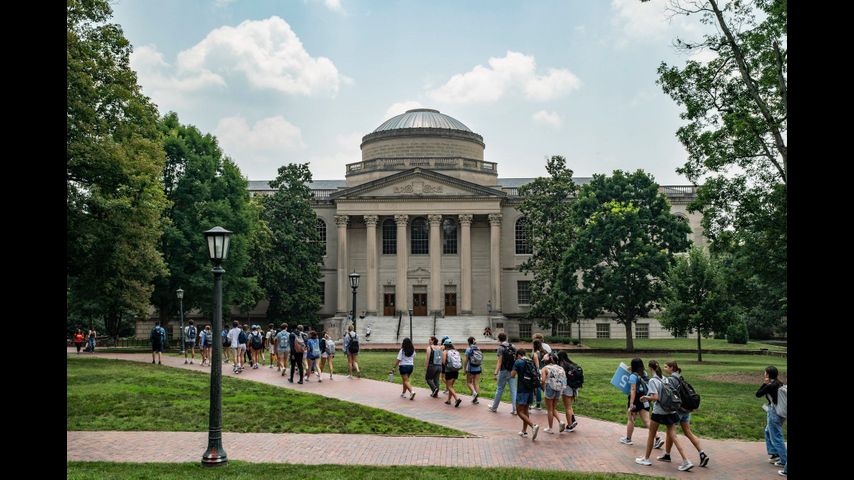Federal appeals court could rule soon on Biden’s student loan repayment plan. Here’s what borrowers need to know
Washington (CNN) — The 8th US Circuit Court of Appeals could rule soon on a Republican-led lawsuit challenging President Joe Biden’s student loan repayment plan after hearing oral arguments Thursday.
The plan, known as SAVE (Saving on a Valuable Education), lowers monthly payments and shortens the time it takes to receive student loan forgiveness. The plan launched last year but has been on hold since July due to the litigation.
Biden launched SAVE after the Supreme Court struck down his signature, one-time student loan forgiveness program. If allowed to move forward, the repayment plan could be the most significant change the president was able to make to the federal student loan system during his term. Eight million people are currently enrolled in the plan.
The lawsuit was filed in April by attorneys general in Missouri, Arkansas, Florida, Georgia, North Dakota, Ohio and Oklahoma.
The states argue that the Biden administration does not have the statutory authority to implement the SAVE plan. But the government’s lawyers say its authority comes from the Higher Education Act that was passed by Congress years ago.
Missouri’s solicitor general, Joshua Divine, said in court Thursday that the government’s argument “makes a mockery of the entire statute.”
The case was heard by a panel of three judges, all of whom were appointed by Republican presidents. The judges did not provide a deadline for their ruling.
Earlier this week, the Department of Education released some updates on the status of SAVE. Here’s what borrowers need to know:
SAVE payments expected to be paused for at least 6 months
The roughly 8 million borrowers currently enrolled in SAVE have been placed in an interest-free forbearance during which they are not required to make monthly student loan payments.
Earlier this week, the Department of Education said that borrowers enrolled in SAVE should expect to remain in the interest-free forbearance for at least six more months, pending legal developments. The department is currently working with its student loan servicers to align their systems with the court’s injunction, a process that could take months.
Like other existing student loan repayment plans, SAVE ties a borrower’s monthly payments to his or her income and family size and offers loan cancellation at the end of the payment term.
But SAVE is the most generous plan for low-income borrowers and can cut payments in half for people who have loans they took out for undergraduate school. Some borrowers with small amounts of student debt could see loan forgiveness in just 10 years under the plan.
SAVE payment pause does not count toward loan forgiveness
The pause on payments is good news for many of the impacted borrowers. But it could potentially delay student loan forgiveness for some of them.
That’s because the time in forbearance will not count toward the number of payments required to be eligible for debt relief under programs like Public Service Loan Forgiveness.
Under that plan, eligible public-sector workers can see their remaining student loan debt wiped away after making 120 qualifying monthly payments.
Some borrowers may be eligible to “buy back” months of PSLF credit for time spent in forbearance as a result of the litigation. More information about that process can be found on the Federal Student Aid website.
Older repayment plans to reopen later this fall
Some borrowers, like those pursuing PSLF, may want to switch out of SAVE and into a different repayment plan so that they can continue earning credit toward loan forgiveness.
Currently, the only other qualifying income-driven plan available for most borrowers is Income-Based Repayment, or IBR. But the Department of Education said earlier this week that it will take regulatory action this fall to reopen two other plans that closed to new enrollment in July because the SAVE plan had offered the same or better benefits.
The department plans to reopen the Pay As You Earn, or PAYE, repayment plan and the Income-Contingent Repayment, or ICR, plan.
There could be drawbacks to switching plans. Borrowers may face higher monthly payments under other income-driven repayment plans than they were paying under the SAVE plan. Plus, unpaid interest can capitalize when a borrower voluntarily switches in and out of certain repayment plans.
Some student loan forgiveness on pause
Income-driven repayment plans promise student loan forgiveness after a borrower makes either 20 or 25 years of qualifying payments. But the Department of Education is not currently canceling student loan debt under the SAVE, PAYE or ICR repayment plans due to the court injunction.
Borrowers who reach the qualifying number of payments needed for debt relief during this time will be placed in an interest-free forbearance.
Borrowers enrolled in the IBR plan, which was enacted under a separate law, are not impacted and can still receive loan forgiveness if they reach the required payment amount.
Biden’s other student loan proposals face lawsuits
After Biden’s signature, one-time student loan forgiveness program was struck down by the Supreme Court last year, he pledged to find another way to broadly cancel student loan debt.
A new set of proposals released in April would, among other things, cancel accrued interest for borrowers whose balances are bigger than what they originally borrowed. The proposals have yet to be finalized but are already facing a legal challenge from a group of Republican-led states.
Still, the Biden administration continues to forgive student loan debt through existing programs and has so far approved the cancellation of more than $175 billion for nearly 5 million people.
The-CNN-Wire
™ & © 2024 Cable News Network, Inc., a Warner Bros. Discovery Company. All rights reserved.





